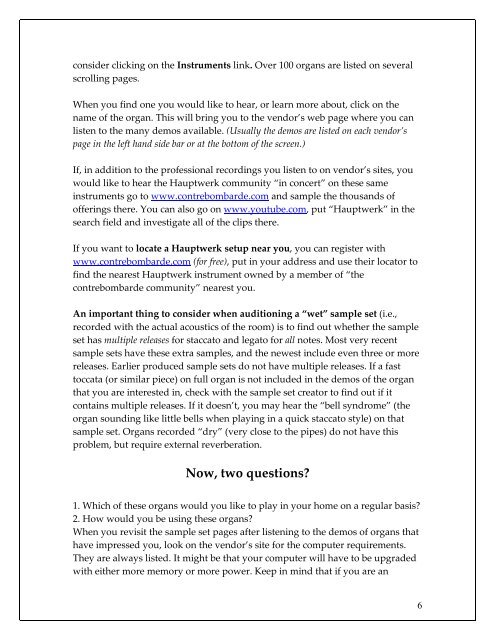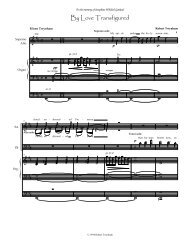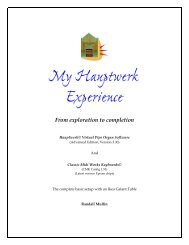Download - Randall Mullin Website
Download - Randall Mullin Website
Download - Randall Mullin Website
You also want an ePaper? Increase the reach of your titles
YUMPU automatically turns print PDFs into web optimized ePapers that Google loves.
consider clicking on the Instruments link. Over 100 organs are listed on several<br />
scrolling pages.<br />
When you find one you would like to hear, or learn more about, click on the<br />
name of the organ. This will bring you to the vendor’s web page where you can<br />
listen to the many demos available. (Usually the demos are listed on each vendor’s<br />
page in the left hand side bar or at the bottom of the screen.)<br />
If, in addition to the professional recordings you listen to on vendor’s sites, you<br />
would like to hear the Hauptwerk community “in concert” on these same<br />
instruments go to www.contrebombarde.com and sample the thousands of<br />
offerings there. You can also go on www.youtube.com, put “Hauptwerk” in the<br />
search field and investigate all of the clips there.<br />
If you want to locate a Hauptwerk setup near you, you can register with<br />
www.contrebombarde.com (for free), put in your address and use their locator to<br />
find the nearest Hauptwerk instrument owned by a member of “the<br />
contrebombarde community” nearest you.<br />
An important thing to consider when auditioning a “wet” sample set (i.e.,<br />
recorded with the actual acoustics of the room) is to find out whether the sample<br />
set has multiple releases for staccato and legato for all notes. Most very recent<br />
sample sets have these extra samples, and the newest include even three or more<br />
releases. Earlier produced sample sets do not have multiple releases. If a fast<br />
toccata (or similar piece) on full organ is not included in the demos of the organ<br />
that you are interested in, check with the sample set creator to find out if it<br />
contains multiple releases. If it doesn’t, you may hear the “bell syndrome” (the<br />
organ sounding like little bells when playing in a quick staccato style) on that<br />
sample set. Organs recorded “dry” (very close to the pipes) do not have this<br />
problem, but require external reverberation.<br />
Now, two questions?<br />
1. Which of these organs would you like to play in your home on a regular basis?<br />
2. How would you be using these organs?<br />
When you revisit the sample set pages after listening to the demos of organs that<br />
have impressed you, look on the vendor’s site for the computer requirements.<br />
They are always listed. It might be that your computer will have to be upgraded<br />
with either more memory or more power. Keep in mind that if you are an<br />
6





